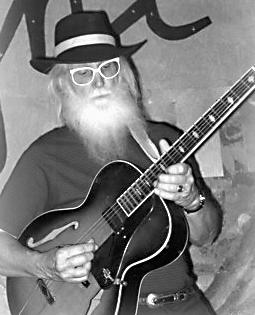|
Reminiscing with Slim Richey |
 |
|
by Paul Klemperer
Guitarist Slim Richey just celebrated his 64th birthday, which makes him something of an elder statesman in the Austin jazz scene. He bills himself as "the most dangerous guitarist in Texas" and has the credentials to back it up. He's toured in Europe and Japan and worked with big names like Maryann Price, Marty Stuart, David Amram, Ricky Skaggs and Ray Price. He divides his time now between teaching and playing with two groups, the Jazz Pharoahs and Slim Richey's Dreamband.
Born in Atlanta, TX, Richey first played in Austin in 1956 as part of gubernatorial candidate Ralph Yarborough's campaign band. In those days politicians would draw crowds by having musicians play in the street. When enough people were drawn to the melodious sounds, the candidate would step up to the microphone and unleash his own performance. "We played four or five times a day," Slim recalls. "We'd show up at the designated spot, and there would be a flatbed truck for us to use as a stage."
Slim spent some time in Dallas and moved to Ft. Worth in 1967, where he spent the next 25 years. There he formed his own company, Ridgerunner, which specializes in various music related products. Still running the company today, Slim notes, "I've sold a lot of things over the years, including my own brand of mandolins in the 1970's. Now it's mostly music, instructional books and videos. We did an instructional video with jazz guitarist Herb Ellis, for example." Distributed by the Mel Bay Company, these books and videos offer instruction on how to play string instruments such as the bass, mandolin and fiddle as well as Slim's own creation, the "Instant Jazz Guitar." "Mel Bay's company distributes to retail stores, but if people want particular items they can go to our website, which is www.ridgerunner.com," he adds.
Back in Ft. Worth, Slim started a jazz rehearsal group and ran a regular jazz jam at the Hop through the 1980's. "It was a swinging club back then, but it's changed now," Slim reflects. In 1992 he moved with wife Francie, who plays upright bass with Slim, down to Hays County, south of Austin. "That's when I started sitting in with the Pharoahs. I just started playing in Austin more and more." Slim and Francie have land down in Hays, which they fondly refer to as "Eternal Camp Peckerwood," and also have a getaway place out in Terlingua near Big Bend, where a number of former Austin musicians have relocated.
Slim loves Austin and its musicians but doesn't hesitate to say that "it's a scrambling town" because he certainly doesn't play here several days a week for the money. (The Jazz Pharoahs play regularly at the Elephant Room and Jazz.) "Since last fall it's been worse. Nightclubs are good places to advertise and stay in practice but not to make money. The money is usually in corporate parties, but they have really dried up. Hopefully that will change. Mainly I like the jazz scene, the music community in Austin. The players are competitive, but they're not cutthroat or back-stabbing."
Slim started the Dreamband as a way to break out of the mold of traditional jazz. The band blends the torch/cabaret singing of Alice Spencer with a Count Basie style rhythm section and the more modern solos of trumpeter Martin Banks and saxophonist Larry "D.C." Williams. "It's a weird concept to explain, but we blend a lot of different jazz styles. Still, it's very danceable music. We mix a pulse with stretching out, and try to pick the best of each period."
I asked Slim to assess the Austin music scene. After a moment's thought, he said, "For a medium-sized town, we've got one of the best music communities. But there isn't enough support for national class musicians. It seems when players get to that level, they need to leave. We do have a lot of support from fans, but we need more. And we need more than one good venue, a bigger concert venue. There needs to be a support network, between clubs, media, booking agents, publicists and so on."
I also asked him if he had any advice for young players. "I'd say that there are three elements every gig has: fun, learning experience and money. If two of them are strong, then it's a good gig. You can have fun, learn something, and the money doesn't matter so much. But if two of them are weak, one of them had better be damn strong!"
|
||
top | this issue | ADA home |
||
 Slim's abilities on mandolin and fiddle brought him bluegrass gigs, and he found himself playing with David Amram at the Kerrville Folk Festival in the early 1980's. "David Amram liked the fact that I had a jazz background. Even though I wasn't as good as some of the other bluegrass fiddlers, my triplets had more swing to them, which he liked. I told him I was really more of a guitarist, and he must have told (festival organizer) Rod Kennedy that, because in 1985 Kennedy called me to be the staff guitarist up in Eureka Springs, Arkansas."
Slim's abilities on mandolin and fiddle brought him bluegrass gigs, and he found himself playing with David Amram at the Kerrville Folk Festival in the early 1980's. "David Amram liked the fact that I had a jazz background. Even though I wasn't as good as some of the other bluegrass fiddlers, my triplets had more swing to them, which he liked. I told him I was really more of a guitarist, and he must have told (festival organizer) Rod Kennedy that, because in 1985 Kennedy called me to be the staff guitarist up in Eureka Springs, Arkansas."